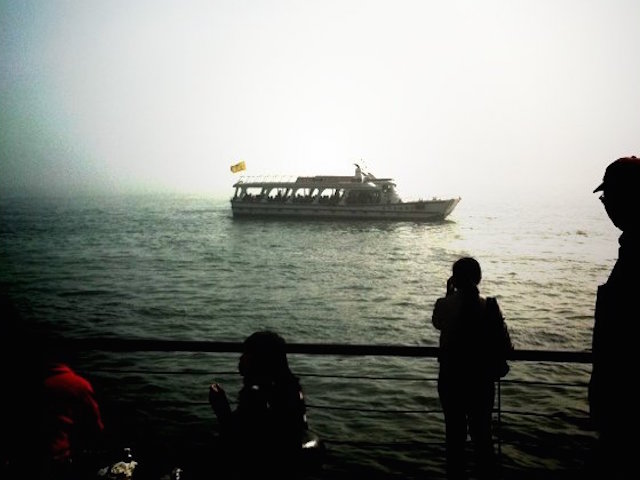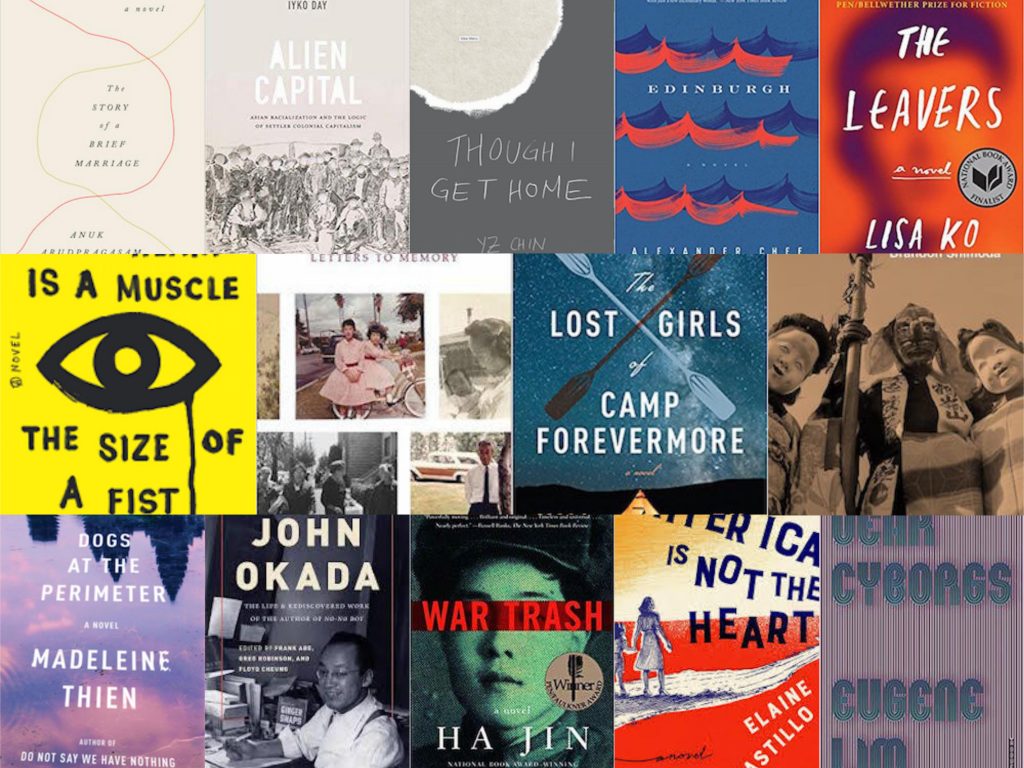Borders and exclusion are the flip side of identity. They are all components of the question: “Who belongs?”

September 17, 2018
I went on Love Boat when I was seventeen.
It was the summer before college, and my parents sent me to Taiwan, the country my mother is from, for the government-funded “study tour” to connect overseas Chinese youth to their cultural roots. For a month, I attended Chinese-language and folk culture classes, visited historic sites, and embarked on a nine-day bus tour of Taiwan alongside several hundred other 18-to-24-year-olds from Europe, Australia, and the Americas. Li ho, I learned, is “hello” in the Taiwanese dialect, as distinct from Mandarin. In stick-fighting class, we practiced striking imaginary enemies, twirling and swinging a wooden staff. At Taroko Gorge, a famed canyon on the south of the island, I scrambled up a rocky slope with friends to a cliff-side temple, flush with a sense of camaraderie. And then there were the quintessential Love Boat activities: flirting, pining, casual sex, making out.
The language and culture activities were part of the official program of the “Expatriate Youth Study Tour” (as it is now called by the Taiwanese government’s Office of Expatriate Affairs), but “Love Boat,” as it is more widely known, is thought to be popular among diaspora Chinese parents for its alter-ego: a place where their Westernized offspring can meet other Westernized Chinese diaspora youth—code for “suitable marriage partners.”
Rumor had it among my fellow campers that the previous summer someone had gotten pregnant—or was it multiple people?—and this was why 11 p.m. bed-check was so stringently enforced. But even the taxi drivers of Taipei knew of the Study Tour’s off-label activities. By 11:15 each night, cabs would be lined up outside the back gate of our dorms, without anyone’s summoning. By 11:30, we would be creeping out of the building in clusters of two or three, staying quiet and keeping low and close to the walls, like we were engaging in covert sabotage and not efforts at endless partying. Once, I was scuttling along the outer wall of the grounds with a friend when we spotted two guys mirroring us along the opposite wall. As we waved at each other across the yard, I thought of the masked gangs of wuxia films, bounding noiselessly across the moonlit rooftops toward freedom.
And freedom was Jagermeister shots on the dance floors of Taipei’s clubs, where under the shroud of low lighting and throbbing bass, flirtations that had begun in the dining hall, the classroom, or excursions to Confucius Temple, found cathartic release. As if imported from the high schools of North America, romances mostly unfolded within the seemingly impenetrable social boundaries of cliques, but to observe it was a mind warp for someone having grown up in a white-dominated Canadian city. Everyone—the Mean Girls, the skaters, the b-boys, the jocks, the art kids and the nerds—was of Chinese descent.
This was a radical departure from Hollywood movies about teenage America, which are overwhelmingly white with a sprinkle of black, but all their usual tropes remained: radical self-discovery, social gracelessness, the intensity of first love. One of my new friends, a warm but naive and romantically inexperienced girl, quickly grew close to one of the boys in our group and fretted over her growing crush for weeks, the prickly new sensations seeming to cause her distress. But by the end of the summer, she had experienced her first kiss. And when, a few years later, I saw a photo of her online wearing a bikini and sash—she was a prize-winner in the Miss Chinese International pageant in Hong Kong—I wondered if Love Boat was when she began to recognize the power of her sexuality.
Were sex and love—the “Love Boat” moniker—a deviation from the Expatriate Youth Study Tour’s aims of brewing and owning Chinese cultural nationalism? Or were they in actuality more effective than the official culture classes and programming, targeting one of our deepest, most intimate desires as human beings: the desire to belong?
The program was a child of the Cold War and was established in 1966 to generate diaspora support for the Taiwan-based Chinese Nationalists—the Republic of China—against the Communist regime—the People’s Republic of China—that had driven them from the mainland in 1949. Both claimed to be the legitimate government of China, and the Nationalists branded Taiwan as the true custodian of Chinese culture, values, and traditions. For a while, it worked: from 1950 to 1965, Taiwan received billions of dollars in economic and military aid from the U.S. to help contain the spread of communism in Asia.
Then in the 1960s, a flood of newly independent, non-aligned countries in Asia, Africa, and Latin America gained membership to the United Nations and forged relationships with the People’s Republic of China. The Western superpowers were soon pushed to recognize the Communist regime, which meant severing diplomatic relations with Taiwan. And a year after U.S. aid to Taiwan ceased, the Expatriate Youth Study Tour was born: a way of showing overseas Chinese—Taiwan’s natural allies abroad—that we too were part of this nebulous entity, the Nationalist-led Chinese nation.
By the time I attended Love Boat, the programming showed no signs of political indoctrination, either overt or covert. (China, much less the relationship between Taiwan and China, was barely mentioned.) Yet, I did not make out with anyone either. I did not date anyone, or find anyone to marry, or decide that if and when I got married, that person would be Chinese. But I made a diverse assortment of friends who I loved—friends who were soccer fanatics, aspiring bankers, singer-songwriters, studious pre-med nerds, artists perpetually drawing in notebooks. And, obviously, all of them were Asian. This was an unexpected relief. For the first time ever, I did not feel trapped in my Asianness, and for that reason, I have always wondered whether the Study Tour “worked” on me. Not despite, but because, of my Asianness, I found that I belonged.
I now understand that this feeling of belonging is what Love Boat was attempting to forge. Taiwan, an island the size of Maryland, has a population of 24 million, compared with 1.4 billion people in China, and some 46 million ethnic Chinese outside of Taiwan, China, Hong Kong, and Macau. Today, China also offers similar study tours, summer camps, and seminars through its own Overseas Chinese Affairs Offices—the two nation-states competing for the privilege of being seen as Motherland to ethnic Chinese abroad. Once, the Taiwan Strait symbolized an ideological rift: global Communism versus the allies of the capitalist West. But two essentially capitalist societies now occupy either side of the quasi-international border. And as China’s global influence multiplies, the teams continue their competition over ownership of Chinese identity.
There is no deeper way of forging the feeling of belonging than through intimate personal relationships: friendships, family, love, and sex. And Love Boat did this far more effectively than the Study Tour’s classroom programming. On the last day of camp, I cried as I bid farewell to my new friends from Venezuela, France, Jamaica, Australia, and North America. We promised to stay in touch. The intensity of sharing dorm rooms for an entire month, eating our way together through every night market we passed, immersing ourselves in the shared traditions of our parents, and supporting each other through lightning crushes, romances, and breakups—this had created between us lifelong friendships, the kinds that transcend time and place.
Within a year, I lost touch with every Love Boat friend I had made. Four years later, after college graduation, I returned to Taiwan to improve my Chinese, spend time with family, and experience a kind of anonymity that is only enjoyed when one blends in, when one belongs. I became a skilled enough Chinese reader to translate texts into English. My grandma told stories about the freedom she felt as a nurse in the era of Japanese imperialism, my uncles following with tales of family hardship during the Nationalist occupation. I developed a deep appreciation for Taiwan’s laid-back and progressive atmosphere, well-funded public infrastructure, and rich arts and culture scene. And then a different reality sank in. After a year, I began to miss making off-hand Simpsons references and deploying sarcasm freely without receiving quizzical looks. Humor is highly contextual. I was forced to accept that, while I share ethnic Chinese roots with the vast majority of Taiwan’s population, culturally, I am deeply North American.
In what way does diasporic Chinese identity matter? If my ethnic roots didn’t bestow upon me a deeper sense of belonging in Taiwan, then what do I actually share—apart from a racial identity, and fleeting, month-long friendships when I was seventeen and far removed from normal life—with my fellow Love Boaters?
In July 2018, as I began writing this essay, I remembered that one of my closest friends on Love Boat was a lifelong New Yorker. While we never stayed in touch, I have now been living in his city for a dozen years. So I tracked him down. We decided to meet at a Midtown happy hour event, and I recognized him immediately. He looked almost exactly the same, with even his hair buzzed short in a similar way as before. As we reminisced, I also remembered why we were friends—conversation was easy and our exchanges were quick, a sign that our sensibilities and sense of humor match.
He asked what I’ve been doing in New York City.
I have been an editor at a left-wing book publisher for several years, I said, and now I am also a journalist who covers progressive social movements and politics. “What about you?”
He said that shortly after Love Boat, he joined the NYPD for a few years, where he worked as both a riot cop and a beat cop.
Instantly, I thought of the 2004 protests of the Republican National Convention in New York City. I was still a university student in Canada at the time, but many of my friends today participated in the marches, performances, and direct actions that the NYPD responded to with mass arrests—arrests that federal judges have since ruled were illegal. Did he cross paths with them? And what about my friends who later organized against New York City’s now-defunct “Stop and Frisk” policy, which effectively authorized beat cops to racially profile black and brown men?
But I quit after a few years, he said.
“So what about now?”
At first, he didn’t want to say, but then he told me anyway.
He works for ICE—U.S. Immigration and Customs Enforcement—and specifically in the unit that investigates immigration fraud, he said. He knew that given the current media frenzy over ICE’s child detention border facilities this sounded especially bad, but he reassured me that this was not his line of work. He targeted the “bad guys,” the “big guys” who were defrauding the U.S. immigration system, he explained, and he was keeping America safe.
I thought of how, just a week earlier, I had joined a “Families Belong Together” march in New York City, in which the slogan “Abolish ICE” had featured prominently. I also thought of the U.S. Citizen and Immigration Services’ newly-formed task force to strip naturalized citizens of their U.S. citizenship by identifying people who had lied on their applications—in other words, people who had “committed immigration fraud.” Was it ironic that the American I became friends with in Taiwan, through a program that encourages overseas Chinese to think of Taiwan as our own nation, is now policing the U.S. border?
I asked myself the question, but mostly out of wonderment because I knew it wasn’t ironic. Just as heightened U.S. border enforcement and fear-mongering over Muslim and Latinx immigrants helped Republicans consolidate power after 9/11—by singling out who doesn’t belong, they cast themselves as the necessary defenders of the American way of life and identity—Taiwan is strengthening its position in its own border conflict by helping overseas Chinese discover our Chinese identity. Borders and exclusion are the flip side of identity. They are all components of the question: “Who belongs?”
We parted ways at a pizza joint nearby—were these slices a hat-tip to our shared New Yorker identity?—and vowed to hang out again soon. Will we? On the subway back to Brooklyn, I looked at a photo he had texted earlier of our Love Boat crew together. I looked happy, but I can no longer place names to many of the faces.
For a month when I was seventeen, these were my good friends. I wonder what I have in common with them now. As a personal life choice, I still embrace my Chinese (and Taiwanese) roots, because it is a part of my family and, by extension, who I am, but I am also deeply skeptical of Chinese identity as a political mobilizing force. Cultural nationalism, defined as much by what it is as what it is not, is always exclusionary, and as the basis of a political state program, this produces exclusionary political regimes.
Already, Taiwan’s White Terror, the period of martial law that lasted under the Nationalists from 1949 to 1987, saw 140,000 Taiwanese dissidents arrested and another 3,000 to 4,000 executed for perceived allegiances to the Chinese Communists; my grandmother even sometimes spoke fondly of the Japanese colonial era that preceded Nationalist rule. China is now holding in detention camps one million Uighur Muslims—a group it sees as a threat to its own ethnic Han identity. And what do the diasporic identities of Chinese American consumers matter to the Chinese workers who manufactured the iPhone I was holding, in the Guangzhou, China factory owned by the Taiwanese multinational company Foxconn?
I saved the photo to my phone. Later, I showed it to some friends, but my best friend had trouble picking me out: I was exceptionally tanned that summer, and apparently my face has changed a little too. The unspoken implication was that, to my friend, I could have been one of the other girls in the photo—or at least I could have been if it were solely based on appearances. The things that set us apart from one another were not visible.
This story is part of a special issue of The Margins around the theme “Camp.” Look out for more essays, stories, and poems in the issue in the coming weeks.



